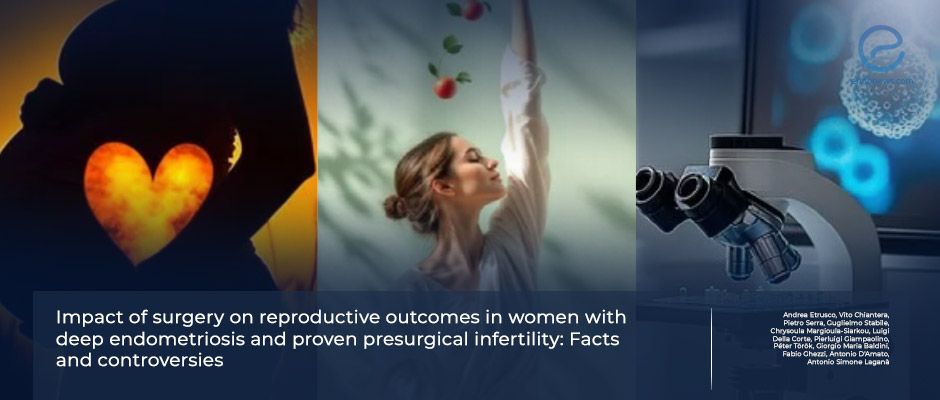Surgery for Deep Endometriosis: Reproductive Outcomes in Infertile Women
Dec 20, 2024
The use of ART in women with deep endometriosis before or after the surgery is the main concern.
Key Points
Importance:
- There is currently no clear evidence linking infertility to specific stages of rASRM in deep endometriosis (DE).
- Furthermore, there is a lack of consensus and clear guidelines from leading scientific societies regarding the optimal surgical approach for managing infertility in DE patients.
Highlights:
- Surgery for deep endometriosis significantly improved reproductive outcomes, particularly in enhancing ART success rates.
What's done here:
- This is a systematic review of studies on surgery for DE in infertile women, searching key databases for relevant English-language trials.
- 16 studies meeting inclusion criteria were analyzed, including prospective (3) and retrospective studies.
- Primary outcome was to evaluate the effect of DE surgery on pregnancy outcomes in women with proven infertility.
- Fertility outcomes were analyzed based on surgical approach—anterior pelvic, posterior pelvic, or other locations.
- 947 infertile women were included in the studies of this review had a mean pregnancy rate of 51,3%.
Key Results:
- Pregnancy rate was 51.3% among infertile women after surgery across all 16 studies.
- Anterior pelvic surgery showed pregnancy rates ranging from 50% to 73.7% in a small sample of studies; pregnancy occurred 3-15 months postoperatively.
- Posterior pelvic surgery demonstrated pregnancy rates between 18.7% and 71.7%, though the timeline for pregnancy post-surgery remains uncertain.
- Risk of bias was high in 4 studies, low in 12 studies.
Lay Summary
Deep endometriosis (DE) is a severe form of endometriosis where endometriotic growths invade deeper tissues such as the pelvic organs, including the bowel, bladder, and sometimes nerves. This type of endometriosis is often linked to infertility, but the exact relationship between the severity of the disease and infertility remains unclear.
One of the main treatments for women with DE-related infertility is surgery to remove or reduce the endometriotic tissue. However, the effectiveness of surgery in improving fertility outcomes is still debated. Some studies suggest that surgery can help women conceive naturally or improve the success rates of assisted reproductive technologies (ART), such as IVF. However, surgery itself can also lead to complications such as pelvic adhesions, nerve damage, or organ dysfunction, which could further complicate fertility.
A review by Etrusco et al. from the Paolo Giaccone Hospital in Italy sought to clarify these uncertainties by examining existing studies on the outcomes of surgery for infertile women with deep endometriosis. They included 16 studies with a total of 947 women who were previously unable to conceive naturally. The study found that, overall, 51.3% of these women became pregnant after surgery. However, the authors noted that the results were highly variable, with pregnancy rates ranging from 18.7% to 73.7%, depending on the location of the endometriotic lesions and the type of surgery performed.
The review also highlighted the lack of high-quality evidence, including randomized controlled trials, to determine the best approach for surgical management in these patients. While surgery may help improve reproductive outcomes, the decision of whether to perform surgery before ART remains uncertain. The authors emphasized the need for more research to guide clinicians in making the best treatment decisions for infertile women with deep endometriosis.
This review was recently published in the journal Best Practice & Research Clinical Obstetrics & Gynecology, and underscores the complexity of treating infertility in women with deep endometriosis, highlighting both the potential benefits and risks of surgical intervention.
Research Source: https://pubmed.ncbi.nlm.nih.gov/38910100/
laparoscopic surgery infertility deep endometriosis pregnancy outcomes assisted reproductive technology endometriosis.
DISCLAIMER
EndoNews highlights the latest peer-reviewed scientific research and medical literature that focuses on endometriosis. We are unbiased in our summaries of recently-published endometriosis research. EndoNews does not provide medical advice or opinions on the best form of treatment. We highly stress the importance of not using EndoNews as a substitute for seeking an experienced physician.<< Previous Article

